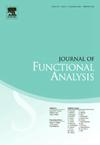Iterations of the inverse Aluthge transform
IF 1.6
2区 数学
Q1 MATHEMATICS
引用次数: 0
Abstract
We prove that for and , the λ-Aluthge transform is a diffeomorphism acting on the Lie group of invertible matrices . In particular, this provides a one-parameter family in . We also characterize the inverse. This characterization is expressed in terms of twisted polar decompositions defined in Bushell's equations and polar decompositions, Mathematische Nachrichten 282 (2009). This will allow us to study the dynamics of the Aluthge transforms for . In this range of values, we prove that the backward iterations of the Aluthge transform converge. This complements the results in The iterated Aluthge transforms of a matrix converge, Advances in Mathematics, 226 (2011), where the proof of the forward convergence was proved for . Since neither the backward iterations for nor the forward iterations for can converge for a non-normal matrix, this completes the study of the dynamics of the one-parameter family of λ-Aluthge transforms in . Some open problems and possible future lines of research are mentioned throughout the paper.
逆Aluthge变换的迭代
证明了当λ∈R且λ≠12时,λ- aluthge变换是作用于可逆矩阵GLn的李群上的C∞微分同构。特别是,它在Diff∞(GLn)中提供了一个单参数族。我们还描述了逆函数。这种表征是用Bushell方程和《Mathematische Nachrichten》282(2009)中定义的扭曲极性分解来表示的。这将允许我们研究λ∈[0,1]的Aluthge变换的动力学。在这个范围内,证明了Aluthge变换的后向迭代是收敛的。这补充了《矩阵收敛的迭代Aluthge变换》,《数学进展》,226(2011),其中证明了λ∈(0,1)的正向收敛性。由于λ∈(0,1)的后向迭代和λ∈(0,1)的前向迭代对于非正态矩阵都不能收敛,从而完成了GLn中λ- aluthge变换单参数族的动力学研究。文中还提到了一些尚未解决的问题和未来可能的研究方向。
本文章由计算机程序翻译,如有差异,请以英文原文为准。
求助全文
约1分钟内获得全文
求助全文
来源期刊
CiteScore
3.20
自引率
5.90%
发文量
271
审稿时长
7.5 months
期刊介绍:
The Journal of Functional Analysis presents original research papers in all scientific disciplines in which modern functional analysis plays a basic role. Articles by scientists in a variety of interdisciplinary areas are published.
Research Areas Include:
• Significant applications of functional analysis, including those to other areas of mathematics
• New developments in functional analysis
• Contributions to important problems in and challenges to functional analysis

 求助内容:
求助内容: 应助结果提醒方式:
应助结果提醒方式:


